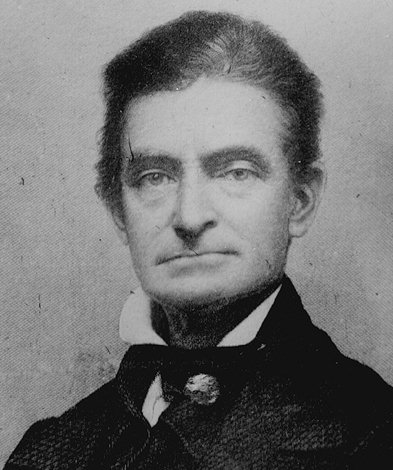
Kevin Murphy

One of the most controversial American figures of the 19th century was John Brown. He was a dedicated abolitionist whom President Abraham Lincoln described as a "misguided fanatic" and American philosopher Henry David Thoreau praised as "a man with ideas and principles." There are many opinions on Brown, some portray him as a violent, crazed man while others a hero and saint. One thing is for sure though, he was a man of faith.
John Brown was born in Torrington, Connecticut on May 9, 1800 to Owen Brown and Ruth Mills. As a child, John's father educated him on the teachings in the Bible, instilling in him a deep hatred for slavery. At the age of 16, John left home with these teachings at heart and entered a preparatory school in Massachusetts to become a Congregationalist minister. Though his schooling would later fail, it drove his beliefs on God to become more orthodox and his opinions on slavery more radical. When he returned home to work at his father's tannery, he met his first wife Diane Luthsik, with whom he had seven children. Unfortunately, Diane died in child birth with their eighth child, and John would remarry and go on to father thirteen more children. After many unsuccessful business ventures Brown fell on hard times. During this period he spent much of his time with the free blacks of the day and became obsessed with the idea of freedom for all slaves.
John began to work towards this freedom by first becoming a "conductor" on the Underground Railroad. Following the ratification of theKansas-Nebraska Act in 1854 though, Brown began to take more drastic measures. When anti-abolitionists pillaged and burned the free state of Lawrence, Kansas in 1856, he and six of his followers including four of his own sons retaliated. May 23 of that year became known as "Bleeding Kansas" when Brown and his followers raided a pro-slavery town along Pottawatomie Creek, they dragged five men out of town killing them with broadswords, supposedly in front of their wives and children. While this extremely violent and evil act may seem to have no moral qualms, this was in fact the first of many acts of faith by John Brown. Faith shines through here when Brown takes such extraordinary measures (violent or not) to stand up for his ideals. More than just standing up for his ideals but also teaching his ideals to others was an admirable trait of Brown. Brown was a loving father. Proof of his love and faith in his sons lies in the fact that he was willing too exchange twenty-two prisoners and his main enemy to freeing the slaves in Missouri and Kansas, Capt. Henry Pate whom he had captured in a recent skirmish for two of his sons who had been captured by anti-abolitionists, forfeiting any chance to of signing a treaty in his favor. He realized the great need for change for the American society of the day and he would go about achieving these changes any way possible, even if it meant risking his own children for the cause.
Brown's actions in Kansas and Missouri gained him popularity among the Northern abolitionist who dubbed him the name "Osawatomie Brown." By 1857 he returned to the East and met with prominent abolitionist of the time. With some of their backing he began to plan his final and most infamous act, the raid on Harper's Ferry. On October 16, 1859 Brown and 21 men (including 5 black men) entered the town of Harper's Ferry, Virginia with the intention of capturing the armory there and using it's resources to arm the slaves who Brown thought would jump at the opportunity to join the resistance movement. With the town's slaves on his side Brown figured he would move out from there, drawing slaves from all over Virginia to his cause. He would then move South, fighting only in self-defense and with the goal of collapsing the economy as the slaves join him. Instead of local slaves flocking to his cause, U.S. Marines led by Col. Robert E. Lee, surrounded the armory. In the fighting that ensued Brown lost two sons and he himself was captured.
His final act of faith was at his trial. There he cried, "Now, if it is deemed necessary that I should forfeit my life for the furtherance of the ends of justice, and mingle my blood further with the blood of my children and with the blood of millions in this slave country whose rights are disregarded by wicked, cruel, and unjust enactments, I submit; so let it be done!" This quote truly shows how strong a man he was, so strong that he was willing to die for his cause. In this speech he also acknowledges his children and all those people black and white who have died for the cause he so vehemently supports. While Jesus may not have agreed with the methods of John Brown, I believe he would have admired him. For as Jesus said, "There is no greater love than to lay down your life for a friend." John Brown did just that.